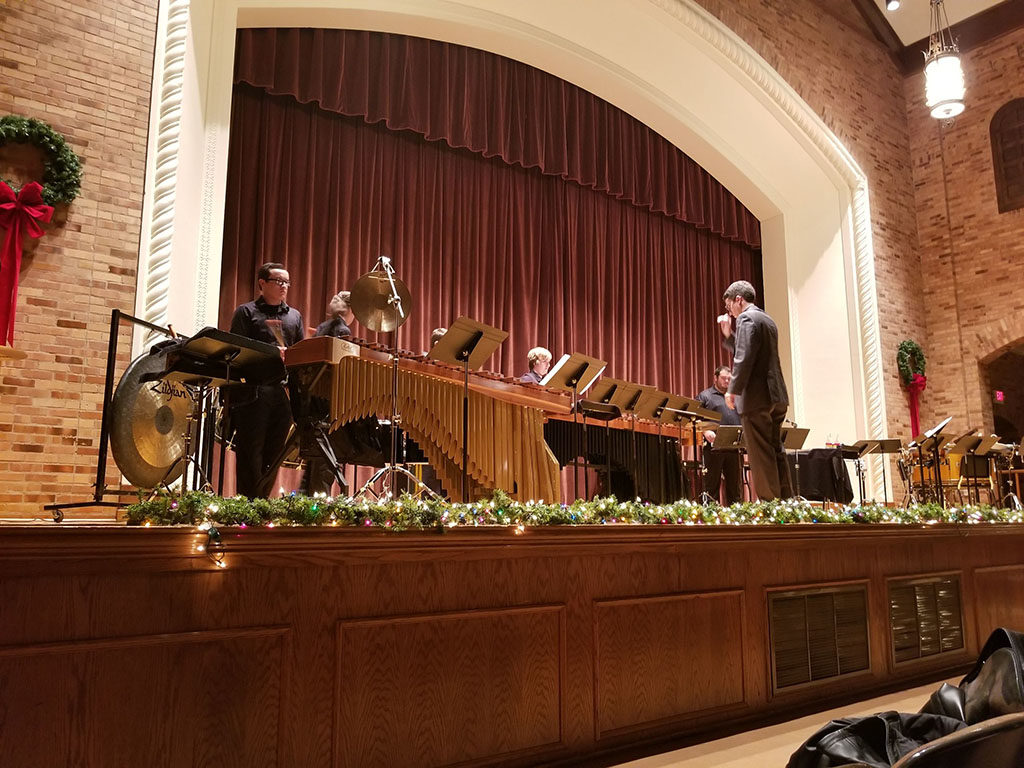
Captivating music from the drums, xylophones and timpani on stage filled the decorated halls of Akin Auditorium. Directed by Gordon Hicken, assistant professor of music-percussion, the performance also featured two numbers by the combined choirs, and 147 people attended the performance by the percussion ensemble at 7:30 p.m. on Dec. 4, 2017.
Garry Boyd-Ward, music education senior, said he was happy with his performance, and because percussion instruments in an orchestra were important in the controlling the flow of music, the lack of a conductor proved a task in itself.
“I took a lot of preparation to do this because most of the pieces I performed on were not conducted by anyone, so it took a lot of communication with the people you are playing with,” Boyd-Ward said. “Percussion really brings out all of the big moments and then at the same time makes all the little moments seem very intricate with all of the things that we play.”
As his music rings across the country, Hicken, in addition to teaching percussion, is a member of the percussion faculty at the Interlochen Summer Arts Camp in Michigan. He taught percussion at Angelo State University, was the drumline director at the University of South Carolina and is familiar with the intricacy of playing. Throughout the performance, Hicken introduced each piece, detailing the backstory and history behind each one.
“They reason why I tell the story behind the pieces is because I don’t want there to be a barrier between what we are doing and what the audience is experiencing,” Hicken said. “I want them to leave with a connection to the performance and that is important because we are not performing music for ourselves. It’s also to educate the public because we play really interesting stuff.”
Intricate thought went into the selection of each piece and Hicken said he wanted it to serve an educational purpose.
“I try to look for great repertoire, but you have to keep in mind this is a class. The pieces I choose have an educational purpose as well as an artistic and entertainment purpose,” Hicken said. “I assign people to the pieces based on their strengths and what they need to work on to strive for a higher level and to gain skill and learn how to work together and to hear different kinds of music.”
Not only did Hicken say he was excited with performances, but he was also impressed with the students’ composure throughout the night.
“It went really well. The students played great. They were really well prepared. I couldn’t be happier,” Hicken said.
For Alvin Waldon, music education sophomore, the piece selection played a key role in the performances and said he was happy that the music really came across to the audience.
“The pieces were very well prepared. The balance was really well overall. The audience seemed to enjoy it,” Waldon said.
In any ensemble, percussion adds grove to the performance, and according to Dale Heidebrecht, assistant professor of music and director of choral activities, the coordination between instruments provides contrast and texture to the pieces.
“The feel of the beats in sometimes determined by the percussion. In an orchestra, it’s a give and take between instruments,” Heidebrecht said. “The combinations between any of them is unfathomable.”
More reactions to the evening:
Kelsey Gwilt, theater junior: “I think we did really well. Usually we are a very loud choir so we can’t hear ourselves. But with a bigger area, we can basically spread out and sound much louder.”
Jonathan Narvais, political science junior: “I thought it was great. Obviously they put a lot of time and you can tell that a lot of hard work went into syncing up everybody’s performance and I was really impressed with how it all played out.”
Daniel Duncan, Quanah resident: “I thought it was great. It’s a little different from what we are used to.”
Correction: In an earlier version of the article, the date of the event was incorrect. The Wichitan regrets the error.














